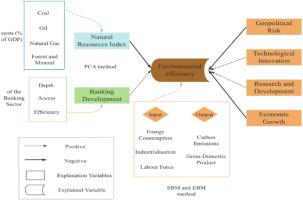绿色大跃进:自然资源和技术变革中的环境效率
IF 16.3
1区 工程技术
Q1 ENERGY & FUELS
引用次数: 0
摘要
环境效率优化资源利用,减少生态足迹;因此,它的评价对于实现与负责任的消费和生产有关的可持续发展目标至关重要。本研究考察了自然资源管理、银行业发展、技术创新和地缘政治风险对g20国家环境效率的影响。本研究采用数据包络分析和主成分分析来测量环境效率,并结合改进的Slack和Epsilon测量方法。本研究采用稳健的横截面自回归分布滞后模型对1996 - 2020年的数据进行分析,得出控制环境效率的动态关系。结果表明,自然资源与基于Slack和epsiln的环境效率指标呈一致的负相关,表明资源财富可能阻碍节能实践的采用。银行业的发展对Slack和Epsilon的环境效率既有正面影响,也有负面影响,这表明金融体系在促进可持续能源投资方面至关重要。技术创新成为提高环境效率的强大积极推动力,与全球强调创新是实现可持续发展的途径相一致。地缘政治不稳定虽然影响较小,但显示出与环境效率的复杂关系。这些见解对于努力平衡经济增长与环境管理的20国集团国家至关重要。该研究为指导政策制定提供了强有力的证据,倡导采用影响金融创新、技术进步和资源管理的综合方法来提高环境效率。本文章由计算机程序翻译,如有差异,请以英文原文为准。

A green leap forward: Environmental efficiency amidst natural resource and technological shifts
Environmental efficiency optimises resource use and reduces ecological footprints; therefore, its evaluation is pivotal to achieving sustainable development goals 12 related to responsible consumption and production. This study examines the impact of natural resource management, banking development, technological innovation, and geopolitical risk on environmental efficiency in G-20 countries. The study applied Data Envelopment Analysis and Principal Component Analysis to measure environmental efficiency, incorporating modified Slack and Epsilon Based Measure approaches. The study analyses data from 1996 to 2020 using a robust Cross-Sectionally Autoregressive Distributed Lag model to draw inferences about the dynamic relationships governing environmental efficiency. The results indicate that natural resources have a consistent negative association with Slack and Epsilon-based environmental efficiency measures, suggesting that resource wealth may impede the adoption of energy-efficient practices. Banking development positively and negatively influences Slack and Epsilon's environmental efficiency, indicating that financial systems are critical in facilitating sustainable energy investments. Technological innovation emerges as a strong positive driver of environmental efficiency, aligning with the global emphasis on innovation as a pathway to sustainability. While less impactful, geopolitical instability shows a complex relationship with environmental efficiency. These insights are essential for G-20 nations as they strive to balance economic growth with environmental stewardship. The study provides compelling evidence to guide policy formulation, advocating for integrated approaches that influence financial innovation, technological advancement, and resource management to enhance environmental efficiency.
求助全文
通过发布文献求助,成功后即可免费获取论文全文。
去求助
来源期刊

Renewable and Sustainable Energy Reviews
工程技术-能源与燃料
CiteScore
31.20
自引率
5.70%
发文量
1055
审稿时长
62 days
期刊介绍:
The mission of Renewable and Sustainable Energy Reviews is to disseminate the most compelling and pertinent critical insights in renewable and sustainable energy, fostering collaboration among the research community, private sector, and policy and decision makers. The journal aims to exchange challenges, solutions, innovative concepts, and technologies, contributing to sustainable development, the transition to a low-carbon future, and the attainment of emissions targets outlined by the United Nations Framework Convention on Climate Change.
Renewable and Sustainable Energy Reviews publishes a diverse range of content, including review papers, original research, case studies, and analyses of new technologies, all featuring a substantial review component such as critique, comparison, or analysis. Introducing a distinctive paper type, Expert Insights, the journal presents commissioned mini-reviews authored by field leaders, addressing topics of significant interest. Case studies undergo consideration only if they showcase the work's applicability to other regions or contribute valuable insights to the broader field of renewable and sustainable energy. Notably, a bibliographic or literature review lacking critical analysis is deemed unsuitable for publication.
 求助内容:
求助内容: 应助结果提醒方式:
应助结果提醒方式:


